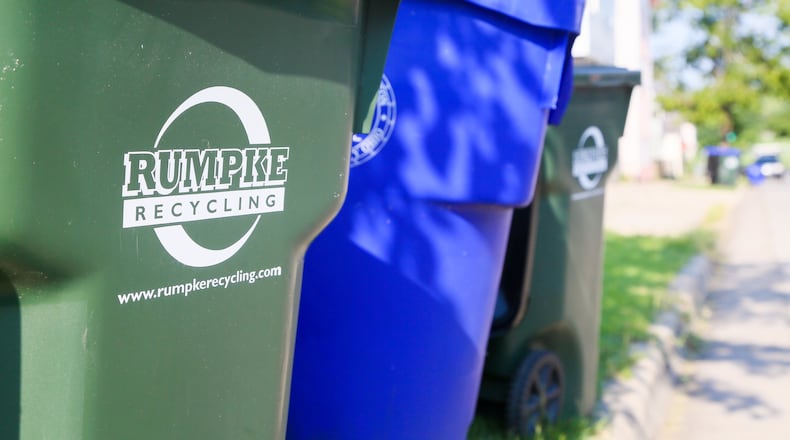“What we’re trying to do is to clean up the contamination in recycling,” said Rumpke spokesperson Molly Yeager Broadwater.
FAIRFIELD NEWS: 14 years after he was killed in Iraq, this Fairfield Marine’s legacy continues to inspire
Rumpke sees between 13 and 18 percent contamination in its recycling pickups, and the goal is to drop that to at most 5 percent because “now there’s a supply and demand issue” with users that purchase bundled recyclable materials, Broadwater said.
“There’s more supply than there is demand for the material. (End users) have really cut down on what they’re accepting as contamination,” she said, adding they’ll take bundles with 5 percent contamination, but want less than 1 percent.
“We need to make sure we’re giving the best quality materials, so putting the wrong items in your recycling container can prevent the right items from being recycled.”
Rumpke is working with the Butler County Solid Waste District and the city of Fairfield on the Butler County audits.
Anne Fieher Flaig, Butler County Solid Waste District coordinator, called it “a unique opportunity” for Ohio, and said multiple agencies “are working on this project as an education pilot to have these intervention opportunities to communicate with consumers at the curb where they recycle.”
Rumpke officials have been discussing the contamination issue with the Ohio EPA for several years, and the state is now working with the Recycling Partnership to develop a program to clean up contaminated recycling. The Virginia-based Recycling Partnership has conducted similar programs to help clean up materials in curbside recycling.
FAIRFIELD NEWS: Fairfield’s growing farmers market will celebrate its summer market opening with a health-focused event
The first step will be on May 20 when there will be a recycling audit of customers in pilot communities at Rumpke’s recycling facility in Hamilton County. The Recycling Partnership hired inspectors to conduct the audit.
“We’re going to take a look at what they’re doing right and what are common in Fairfield that they’re putting in their carts that they shouldn’t be putting in there,” Broadwater said.
In July, Rumpke drivers will work with an advance inspection team that will conduct a five-week curbside audit of customers’ recycling. In Fairfield, there will be 15,000 recycling customers. If the team determines there is too much contaminated or non-recyclable materials — like plastic grocery store bags, clothing batteries or cookware — a notice will be left about what needs to be rectified.
Recycling will not be taken after a one-time warning.
“The idea is you get a warning, and after that we’re going to leave the cart,” Broadwater said. “In some of these communities, you could have half the carts left behind that first week (after the warning). But after that, it goes down dramatically because you have people fix their mistakes. They learn and they don’t make those same mistakes again.”
Fairfield Public Works Director Dave Butsch said some people might have a problem with their filled recycling carts left behind, but “sometimes it’s with these hard lessons that we learn.”
Fairfield was chosen as a pilot community for “several different factors,” Broadwater said.
It’s a “decent-sized city” and has weekly recycling pickup, as opposed to Hamilton, which has every-other-week recycling. Also, it’s not as transient like Oxford where the population shifts once Miami University students move out for the summer and the community is less populated.
“Hopefully by the end of the program, everybody’s doing it right,” Broadwater said.
———
RECYCLABLES AND NON-RECYCLABLES
Here are things Rumpke will take in recycling bins:
• Paper products, like cereal boxes, cardboard and phone books
• Plastic bottles, including emptied drink, shampoo and detergent bottles
• Metal cans, but only non-hazardous and non-flammable materials, like soda cans or canned soups, fruits and vegetables
• Cartons, like emptied juice boxes, orange juice and milk cartons.
Here are things you cannot recycle with Rumpke:
• Clothing
• Batteries
• Plastic bags (grocery stores do take used plastic shopping bags)
• Pots and pans
Source: Rumpke
About the Author

